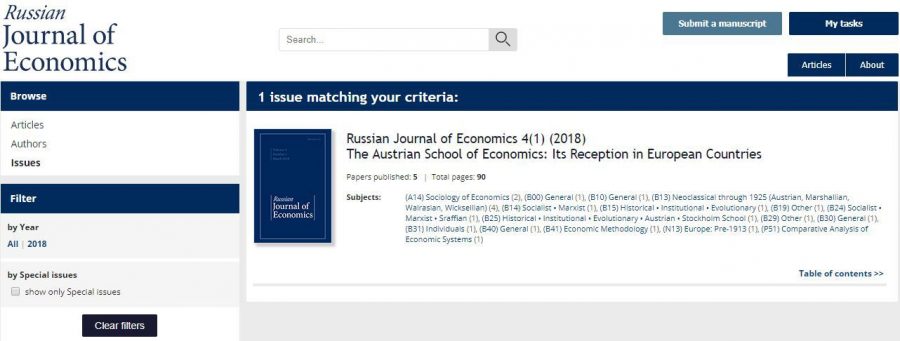This is the first detailed study to test whether the environmental Kuznets curve hypothesis holds true for the Russian Federation
Pollution in Russia increases along with economic growth, but only until it reaches a certain threshold, from where it starts to decrease, demonstrates a recent study conducted by Prof. Natalya Ketenci, Yeditepe University, Turkey.
The validity of the phenomenon, recognized as the environmental Kuznets curve, demonstrates a promising progress for the environmental policies and practices in the Russian Federation. Published in the open-access Russian Journal of Economics, the study also seeks to identify the relationships and causality between pollution, quantified by carbon dioxide (CO2) emissions, and the main factors which affect them.
To do so, the author employs annual data on energy consumption, real income, international trade, level of education and level of urbanization for the period 1991-2016, available from the World Bank’s World Development Indicators database. As a result, the research paper provides recommendations to policy makers in Russia responsible for the environmental quality on national level.
According to the data, Russia remains the fourth largest contributor in terms of CO2 emissions in the world after China, the USA and India in terms of total kilotons, but is ahead of the US when Gross domestic product (GDP) is taken into account. While the US contributes with 0.33 kg of CO2 emissions per 2010 dollars of GDP, Russia accounts for 0.99 kg. Furthermore, despite the global tendency of decreasing annual amounts of CO2 emissions, Russia continues to increase its own.
Interestingly, while Russia has increased its overall CO2 emissions by 14% since 1998 (8% since 2009), its quantity turns out to have actually declined by 45.6% (7.3% since 2009) when the GDP is considered. In agreement with the environmental Kuznets curve hypothesis, this is due to the gradual deployment of more environmentally-friendly equipment in a growing economy.
When studying the key factors for pollution, Prof. Natalya Ketenci concludes that energy consumption, real income, education and urbanization levels are all significant determinants, and open trade has no impact.
In conclusion, the researcher suggests that policy-makers in Russia need to continue with the implementation of policies meant to sustain economic development, thereby favoring cleaner technologies.
Efforts in raising environmental awareness among the population is also a priority. Interestingly, while education in Russia is linked to better access to advanced, yet energy-intensive technology, it is through education that people can be motivated to improve environmental quality and thus persuaded into practices such as recycling and giving up on non-renewable products.
Quite an ambiguous effect on environmental pollution is found in the case of urbanization as well. While generally linked to increased CO2 emissions as a result of greater and denser population, improved recycling organization and hygiene provisions in urban areas work in favor of environmental quality. Therefore, the author recommends that the focus for urban areas needs to be placed on maintaining current policies and decreasing energy intensity, while in rural areas, it is important to implement new efficient environmental policies.
###
Original source:
Ketenci N (2018) The environmental Kuznets curve in the case of Russia. Russian Journal of Economics 4(3): 249-265. https:/
###
Russian Journal of Economics is one of the journals hosted on ARPHA through the platform’s white-label publishing solution.




 What’s on in the new issue?
What’s on in the new issue?